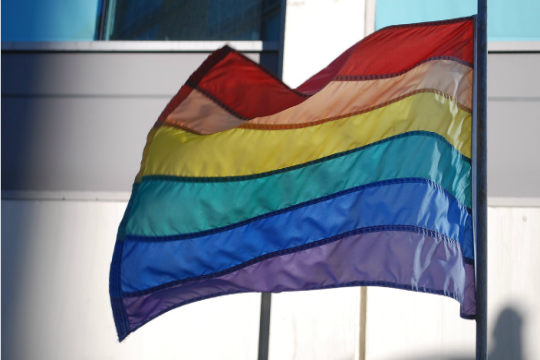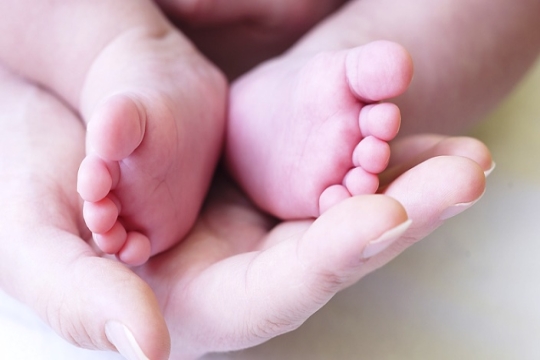
Rosh HaShanah is a joyful reminder of the importance of transformation. While the Jewish new year’s central theme of beckons us to return to who we are, part of that return is self-discovery. With each new year, we are given the opportunity to gain a new sense of who we are and who we’re destined to be.
Rabbi Ari Moffic, director of congregational learning at Temple Beth-El in Northbrook, IL, understands this on a different level. As the mother of a transgender child, Rabbi Moffic knows that personal transformation is a key and beautiful part of who each of us is.
We spoke with Rabbi Moffic about her new children’s book, Love Remains: A Rosh Hashanah Story of Transformation. Co-written with Jessica Leving and illustrated by Teddi Garson and Floyd Kessler, Love Remains centers on a child’s yearly visits to his grandparents’ house for Rosh HaShanah and all the things that change – and stay the same – each year. This story is a testament to the beauty of transformation and the love that an ever-changing family has for one another.
ReformJudaism.org: Where did the concept for this book come from?
Rabbi Moffic: Years ago, I met with another Jewish parent of a transgender child, and we spoke about the need to see kids like ours in picture books. It’s powerful if a child sees a character they can relate to; it validates, it affirms, it feels empowering and communal. And seeing a range of human experiences in books opens up important conversations for families and educators.
What was the process of creating it?
It took a few years to complete. It wasn’t until I worked with Jessica Leving, who had already written a children’s book called Special Siblings: Growing Up with a Sibling Who Has Special Needs, that we found the rhythm for the story. We worked with an editor who helped us, and connecting with Teddi Garson and Floyd Kessler, the amazingly talented artists, brought the story alive.
What made you want to set your story during Rosh HaShanah?
Rosh HaShanah is considered the spiritual birthday for the world: a time of renewal, reflection, reinvention, transformation of our character, and recommitment to partnering with God to care for each other and creation. I thought it was the perfect time to feature a child coming into their own sense of self and to show the range of changes that we experience if we engage in life.
This book captures so many parts of the Jewish experience that are often ignored in white, cisgender, heteronormative-dominant spaces. Why is representation so important, and how can our Jewish communities better foster representation and inclusion?
It’s important to share stories by an array of authors from different backgrounds and featuring all different kinds of characters and storylines so children can better see and understand many voices and lived experiences. As clergy and Jewish leaders, we can aim to tell Tot Shabbat stories and family service stories that are not always heteronormative and featuring white, Ashkenazi families.
By making simple tweaks, we can expand the image of a Jewish family. It’s necessary because it tells people, “We see you, we love you, we believe you about who you are, and your life is part of our tradition, our present, and our future.”
A lot of us in the LGBTQ+ community didn’t – and still don’t – have the benefit of being understood for our identities, especially growing up. How can well-intentioned parents be more like those of the main character, Dan?
Follow your child’s lead and listen to them. Check your own fears and assumptions. Lovingly and nonjudgmentally engage in dialogue, and find a supportive village of friends, allies, and health and wellness providers. In short, celebrate your amazing, creative, brave child for who they are.
I loved the inclusion of loss and mourning in this book, and the emotions that accompany them. As Rosh HaShanah approaches, so many have lost their lives due to COVID-19, while other struggle with a lack of access to health care; so many people are in mourning. What message of hope or comfort do you have for readers during this painful time?
I wanted to include both sad changes and happy changes, small changes and major changes, and the whole range of life (like the Book of Ecclesiastes). I like the idea that some things are important and other things are also important. There is so much suffering and loss right now. People are scared, stressed out, overwhelmed, and frustrated.
The beauty of Rosh HaShanah, especially given its occurrence during fall, is that the leaves will change and the weather will cool – and just as the weather changes, we change along with it. We adapt, we grow, and we move through times that seem impossible to endure, only to come out stronger and one step closer to being who we’re meant to be.
Related Posts

Creating High Holiday Memories for Children

What Should Jewish LGBTQ+ Spaces Look Like?
